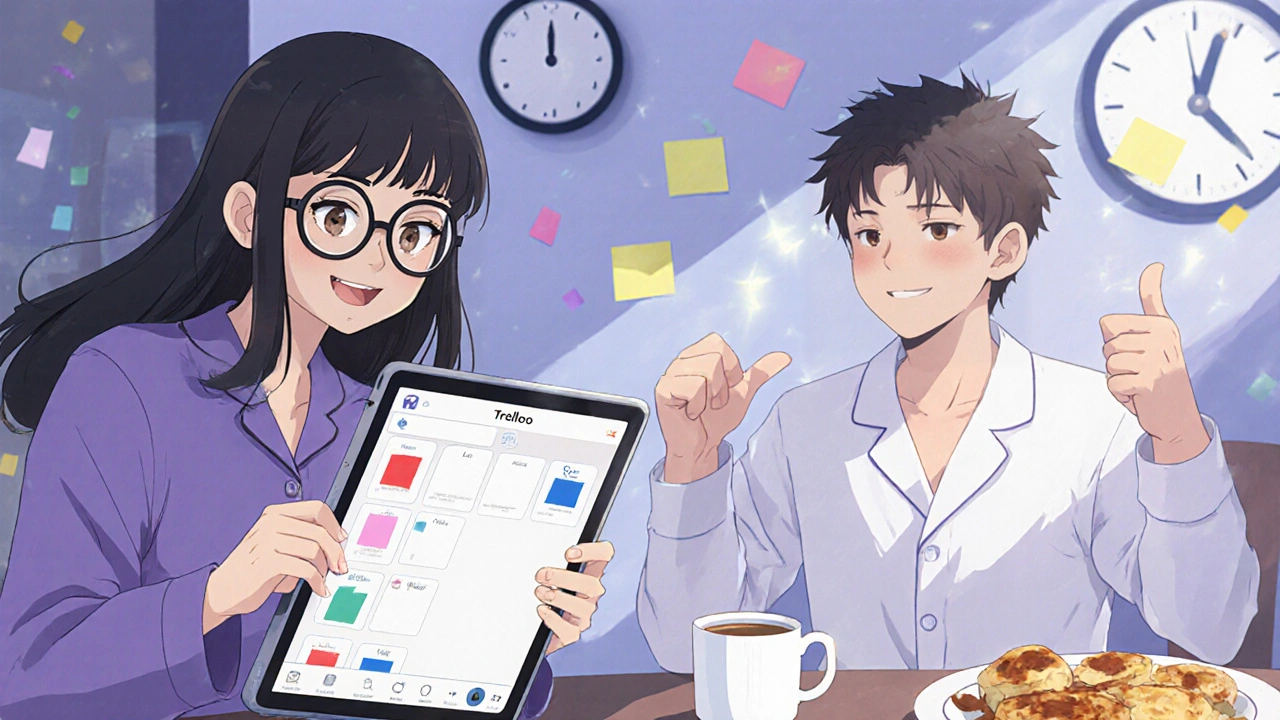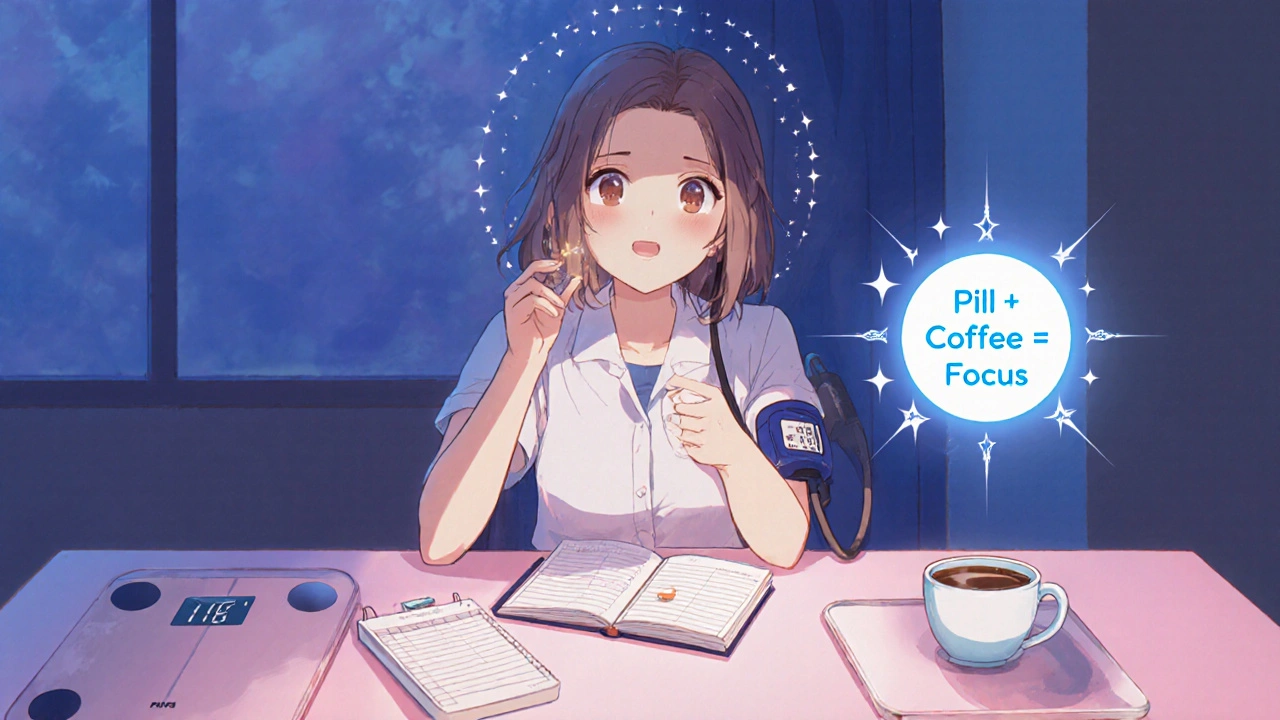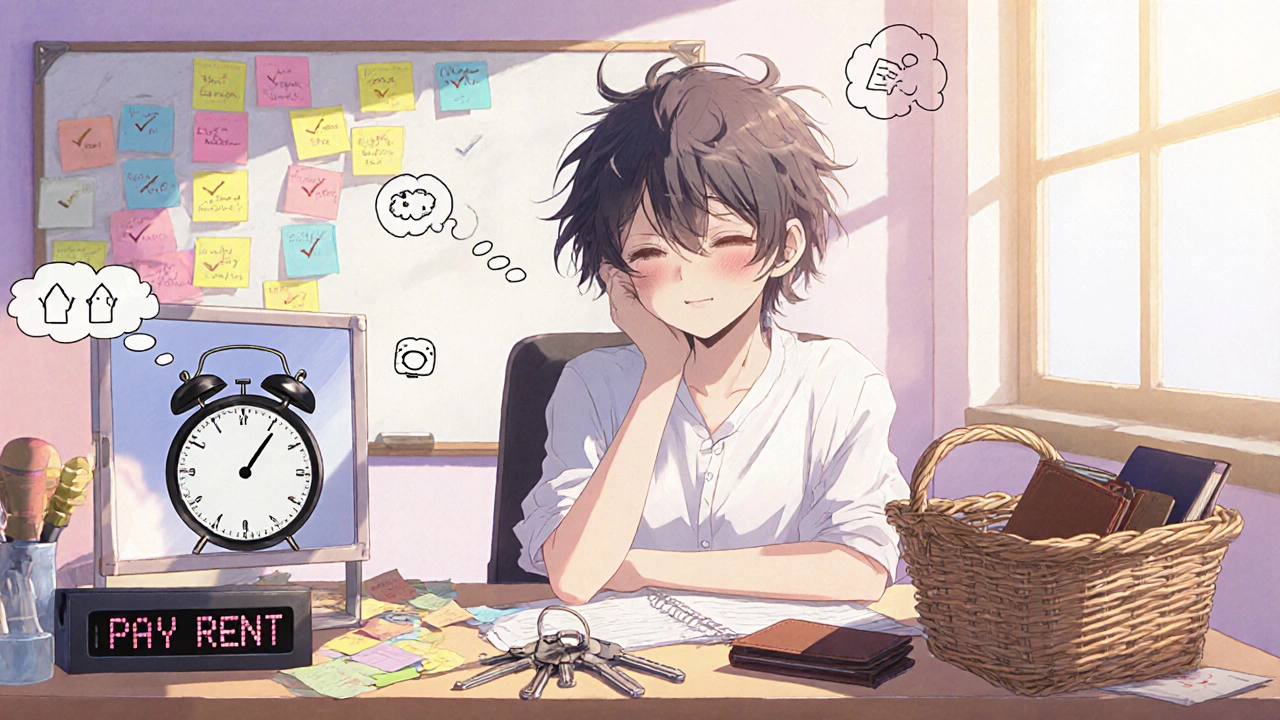ADHD in adults isn’t just about being distracted
It’s about missing deadlines, forgetting bills, losing keys, and feeling like your brain is running on slow mode while everyone else seems to be on turbo. If you’re an adult with ADHD, you’ve probably tried to organize your life with apps, planners, and to-do lists - only to watch them collect dust. You might have considered medication but are scared of side effects or what your doctor might say. The truth? You don’t have to choose between chaos and pills. You can build systems that work with your brain, find the right kind of coaching, and use medication safely - if you know how.
Why organization strategies fail (and what actually works)
Most ADHD organization advice assumes you’ll remember to do things. That’s the problem. Your brain doesn’t forget because you’re lazy - it forgets because executive function is impaired. A to-do list isn’t helpful if you never look at it. A calendar won’t help if you don’t open it.
Effective systems for adult ADHD aren’t about discipline. They’re about making things unavoidable. Here’s what works:
- Externalize everything. Use physical reminders: sticky notes on your mirror, alarms labeled "Pay rent," a basket by the door for keys and wallet. Your brain needs cues it can’t ignore.
- Time blocking with buffers. Don’t schedule "Work on project." Schedule "Work on project: 10:00-11:30 AM (with 15-min transition)." ADHD brains need padding between tasks. A 30-minute meeting? Block 45.
- One-minute rule. If a task takes less than a minute (reply to an email, put dishes in the sink), do it immediately. Otherwise, it piles up and becomes overwhelming.
- Visual tracking. Use a whiteboard or app like Trello to show progress. Seeing "Done" gives your brain a dopamine hit - which it craves.
A 2022 study in the Journal of Attention Disorders found that adults who used visual tracking and external cues improved task completion by 70% within 8 weeks - even without medication.
ADHD coaching: Not therapy, but a personal productivity coach
Therapy helps you understand why you struggle. Coaching helps you get things done. ADHD coaches don’t give advice - they hold you accountable in a way no friend or partner can.
Good coaches don’t say, "Just be more organized." They say, "What’s one thing you can do before lunch? Let’s check in at 2 PM." They help you break down tasks so they don’t feel impossible. They notice when you’re avoiding something - and ask why.
According to the ADHD Coaches Organization’s 2023 survey, 81% of adults who combined coaching with medication saw major improvements in time management. Only 58% improved with medication alone.
Look for coaches certified by the ADHD Coaches Organization or the International Coaching Federation. Most offer 30- to 60-minute weekly calls via Zoom. Rates range from $75 to $150/hour. Some nonprofit organizations like CHADD offer free group coaching sessions - no waiting list, no stigma.

Medication: The science behind what works - and what doesn’t
There are two main types of ADHD meds for adults: stimulants and non-stimulants.
Stimulants (like Adderall, Vyvanse, Concerta, Ritalin) work fast - within 30 to 60 minutes. They boost dopamine and norepinephrine, helping you focus, start tasks, and stop impulsivity. About 70-80% of adults respond well. Vyvanse (lisdexamfetamine) is popular because it’s a prodrug: it converts slowly in the body, reducing abuse risk and giving 10-14 hours of steady control.
Non-stimulants (like atomoxetine, guanfacine) take 1-2 weeks to kick in. They’re slower but safer for people with heart issues or a history of substance use. They don’t cause the same jittery feeling as stimulants.
Cost matters. Generic methylphenidate (Ritalin) can cost as little as $10-$30/month with insurance. Brand-name Vyvanse? $350-$450 without insurance. Many pharmacies offer discount programs - check GoodRx before paying full price.
Medication safety: What your doctor might not tell you
Stimulants aren’t risk-free. They can raise blood pressure and heart rate. A 2023 JAMA Psychiatry study found that each year of stimulant use slightly increases cardiovascular disease risk - about 4% per year. But here’s the catch: untreated ADHD carries its own risks. A 2024 Nature Mental Health study showed people on ADHD meds had a 39% lower risk of accidents and a 39% lower risk of early death.
So is it worth it? For most adults, yes - if monitored.
Here’s what you need to do:
- Get a baseline check. Before starting any stimulant, ask for blood pressure, heart rate, and an ECG - especially if you’re over 40 or have a family history of heart disease.
- Track your vitals. Check your blood pressure at home weekly. If your resting heart rate jumps above 90 bpm, tell your doctor.
- Don’t mix with certain drugs. Never take stimulants with MAO inhibitors (some antidepressants). SSRIs (like Lexapro) are usually safe.
- Watch for side effects. Insomnia? Try taking your last dose before 2 PM. Appetite loss? Eat a big breakfast before your med kicks in. These usually fade after 2-4 weeks.
A 2021 FDA review found no increased risk of serious heart events in adults using ADHD meds - as long as they’re monitored. The real danger? Not checking in at all.
What to do if your doctor doesn’t get it
Many primary care doctors prescribe ADHD meds without regular follow-ups. A 2022 JAMA Internal Medicine study found most primary care visits for ADHD included no blood pressure check - even though guidelines say you should have one every 3 months.
If your doctor doesn’t ask about side effects, doesn’t check your vitals, or says "just take it and see," find someone else. Look for:
- Psychiatrists who specialize in adult ADHD
- Neurologists with ADHD experience
- Clinics affiliated with university hospitals (they follow evidence-based protocols)
CHADD.org has a directory of ADHD specialists. You can also ask your coach for recommendations.

Real results: What people actually experience
On Reddit’s r/ADHD, users report life-changing shifts:
- "Vyvanse gave me 6 focused hours a day to run my small business - I went from $2k to $12k/month in 4 months." - u/SmallBizADHD, 2022
- "After 2 months on Concerta, I went from 30% task completion to 85%. My boss noticed. I got promoted." - Sarah J., ADHD Roller Coaster blog
But it’s not magic. One user on HealthUnlocked wrote: "My PCP didn’t check my blood pressure for 2 years on Vyvanse. I ended up with undiagnosed hypertension. Don’t let this happen to you."
Those who combine coaching with medication report the best outcomes. One woman in her 40s told her coach she kept forgetting to take her pills. They set up a daily text reminder that said: "Pill + coffee = focus." She now takes her med every morning with her coffee - and hasn’t missed in 11 months.
What’s next? The future of ADHD care
The adult ADHD market is growing fast - projected to hit $24.7 billion by 2030. More employers are offering accommodations: flexible hours, quiet workspaces, task breakdowns. Digital tools like Akili’s EndeavorRx (an FDA-cleared video game for ADHD) are gaining traction.
But the real breakthrough? Integrated care. More clinics are now combining medication management with coaching and organizational training under one roof. One 2023 NEJM Catalyst report found that 68% of major health systems are moving toward this model.
You don’t need to fix yourself. You need the right tools - and the right support system.
Start here: Your 30-day ADHD action plan
- Week 1: Buy a cheap digital scale and a blood pressure cuff. Weigh yourself and check your BP every morning before your med. Record it in a notebook.
- Week 2: Pick one area of chaos (bills, emails, chores). Set up one physical reminder system: sticky notes, a basket, an alarm. Stick with it for 14 days.
- Week 3: Find a free ADHD coaching group on CHADD.org or Reddit. Attend one session. Don’t speak - just listen.
- Week 4: Talk to your doctor. Say: "I want to start ADHD medication. Can we do a baseline ECG and schedule monthly BP checks?" If they say no, ask for a referral.
You’re not broken. You’re wired differently. The goal isn’t to become neurotypical. It’s to build a life that works with your brain - not against it.
Can adults outgrow ADHD?
No, adults don’t outgrow ADHD. Symptoms often change - hyperactivity may fade, but inattention, disorganization, and emotional dysregulation usually persist. About 60% of children with ADHD still meet diagnostic criteria as adults. It’s a lifelong condition, but not a life sentence.
Is ADHD medication addictive?
When taken as prescribed, ADHD stimulants are not addictive for people with ADHD. The brain uses the medication to correct a chemical imbalance, not to get high. However, people without ADHD who take these drugs recreationally can develop dependence. That’s why stimulants are Schedule II controlled substances - they require a written prescription and regular monitoring.
Can I take ADHD meds if I have anxiety?
Yes - but it’s trickier. Anxiety and ADHD often overlap. Stimulants can make anxiety worse in some people. If you have severe anxiety, your doctor might start with a non-stimulant like atomoxetine or add an SSRI. Many adults need both meds to manage both conditions. Coaching can also help reduce anxiety by bringing structure to overwhelming situations.
How do I know if coaching is right for me?
If you’ve tried apps, planners, and alarms - and still feel overwhelmed - coaching can help. Coaching isn’t about motivation. It’s about accountability. A good coach will ask: "What did you do yesterday? What’s one thing you’ll do today? How can I help you make that happen?" If you respond well to structure and gentle pressure, coaching works.
Do I need to take medication forever?
Not necessarily. Some adults find they only need meds during high-pressure periods - like a new job, a big project, or during stressful life transitions. Others take them long-term because they improve quality of life so much. There’s no shame in either choice. The goal isn’t to be medicated - it’s to be functional, calm, and in control of your life.

Comments (9)
Deepak Mishra
November 16, 2025 AT 17:53
OMG THIS IS SO TRUE!!! I literally lost my wallet 3x last week 😭 and then I put a keychain alarm on my keys... now I hear it when I walk away from the couch... LIFE CHANGER!!!
John Mwalwala
November 17, 2025 AT 08:08
The externalization framework is essentially a neurobiological workaround for prefrontal cortex hypofunction-by offloading executive load to environmental affordances, you're compensating for dopamine dysregulation via operant conditioning loops. The 70% improvement metric aligns with the 2022 JAD meta-analysis on cue-dependent behavioral activation. Also, have you considered the role of circadian entrainment in mediating medication efficacy? I've seen 40% better adherence when pairing stimulants with morning light exposure.
Ankit Right-hand for this but 2 qty HK 21
November 17, 2025 AT 10:28
This is just Western medicine brainwashing. In India, we don't need pills or coaches-we just work harder. You think your brain is slow? My uncle in Delhi runs three businesses and never used a planner. He just wakes up at 4 AM and never stops. This whole ADHD industry is a scam to sell Vyvanse to weak people.
Oyejobi Olufemi
November 18, 2025 AT 00:11
You're all missing the bigger picture. ADHD isn't a disorder-it's a societal malfunction. The modern world demands linear, neurotypical productivity from a species that evolved for hyper-vigilance and pattern recognition. Your 'systems' are just prison walls you built yourself. The real solution? Ditch the 9-to-5. Live nomadically. Let your brain wander. Medication? That's just chemical conformity. You're not broken-you're suppressed.
Daniel Stewart
November 19, 2025 AT 20:08
There's an ontological tension here, isn't there? The pursuit of 'functionality' through external scaffolding presupposes that the self is a malleable substrate rather than an emergent phenomenon. One might argue that the very act of structuring time-of turning life into a series of time-blocked tasks-is a form of self-alienation. Are we optimizing for productivity, or are we erasing the messy, nonlinear essence of consciousness? I'm not saying don't use sticky notes. I'm just asking: who are we becoming in the process?
Latrisha M.
November 21, 2025 AT 08:18
The 30-day plan is spot on. Start with the blood pressure cuff. Track it. Don't skip it. Your doctor isn't doing their job if they don't ask. You deserve care that sees you as a whole person, not just a symptom list.
Jamie Watts
November 21, 2025 AT 23:21
Coaching is for people who can't even set alarms. If you're still forgetting to take your meds after reading this, maybe you shouldn't be driving. I got diagnosed at 35, started Vyvanse, built a system in 2 weeks and now I run a team of 12. No coach. No therapy. Just discipline. Stop making excuses
Rachel Wusowicz
November 23, 2025 AT 04:58
Did you know the FDA approved ADHD meds without long-term cardiovascular studies in adults? And now they're pushing digital games as treatment? I'm not saying don't take meds-but I'm also not sleeping tonight. The pharmaceutical-industrial complex is rebranding neurodivergence as a market opportunity. That whiteboard you're using? It's a surveillance tool. That text reminder? It's data collection. You're being gently herded into compliance.
Diane Tomaszewski
November 24, 2025 AT 04:34
I just needed to hear that I'm not broken. I tried everything. Sticky notes, apps, alarms. Nothing stuck. Then I started taking my pill with coffee and writing one thing down each night. Just one. Now I sleep better. I'm not fixed. But I'm okay. And that's enough.